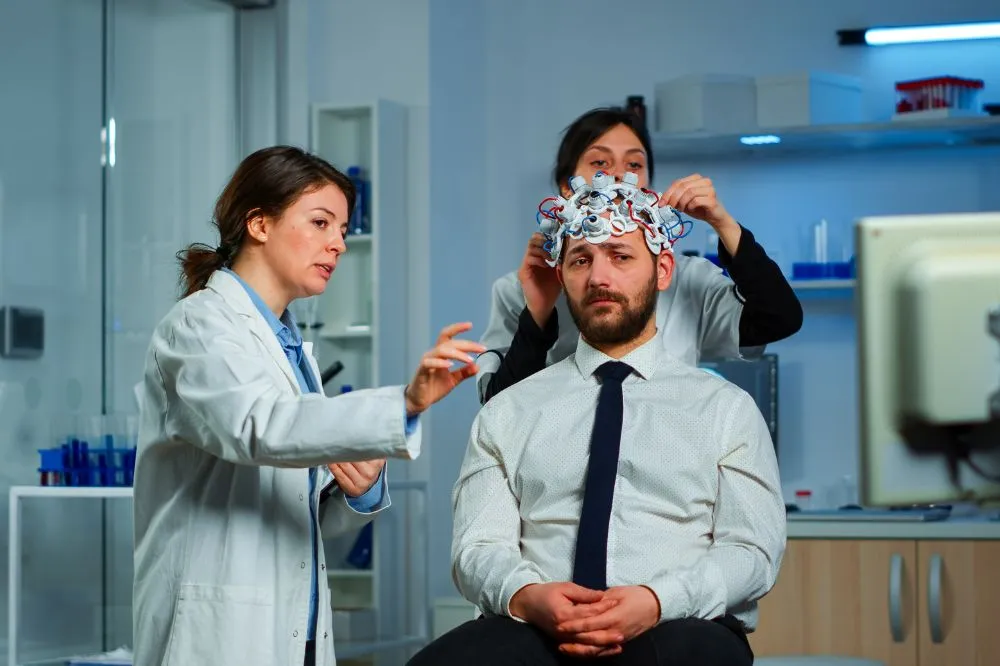Summary: Although emotional disorders are quite common, there are no reliable biomarkers for diagnosing these conditions. Not only that, lack of biomarkers means that there is no reliable way to monitor the efficacy of treatment therapy. Now researchers think that they have found a way of monitoring changes in emotional regulation in individuals. They found that emotional changes can be measured by tracking theta waves using an electroencephalograph. Researchers think this will help monitor the severity of emotional disorders and find effective treatments.
Emotional disorders like anxiety, various mood issues, and borderline personality disorders are common. However, there are many problems in diagnosing and treating these conditions. Doctors do not know what precise brain changes cause these issues.
Even worse, there are no dependable lab tests to confirm the diagnosis of various emotional disorders. This creates many challenges for doctors. It not only makes diagnosing these conditions highly challenging; it also makes monitoring the progress of treatment difficult. This also poses a significant challenge for researchers.
Since there is no reliable way to diagnose and monitor the progress of the disease condition, it means that carrying out research on the subject is also tricky. Thus, finding effective treatments is also quite challenging.
Just take an example of anxiety. Almost everyone experiences anxiety in their life. Not all cases of anxiety need treatment. However, the decision to treat someone is taken purely on clinical grounds. There is no test to check the severity of anxiety. When treatment begins, doctors depend on patients’ self-reporting, as they have no other reliable way to know if their treatment is working.
Researchers have long been looking for reliable biomarkers that could help accurately diagnose emotional disorders, understand their severity, and measure the success of treatment based on objective tests rather than on self-reported patient outcomes.
Theta waves may help measure emotional regulation
The human brain produces different wave patterns that are readily monitored with the help of electroencephalography. These brain waves keep changing according to different physiological states and emotional responses. In addition, pathological processes may also alter wave patterns.
In 2013, researchers first identified that theta brain waves have much to do with emotional regulation. In the new study, Montreal University researchers further tested these findings on 24 adults.
It is a relatively simple experiment to prove the complex concept. They attached the electrodes to the scalp of 10 men and 14 women to see how they react to various emotional stimuli, especially to threats. Thus, they showed them disturbing images of armed men and threatening dogs.
During the experiment, they continually monitored the changes in the brain wave pattern. As a result, they saw that brain wave patterns change according to different emotional responses. In addition, they could confirm that theta waves were especially a good marker for emotional regulation.
Of course, theta waves are not the only waves recorded during the experiment. However, researchers found that other waves, like alpha waves with a frequency between 8 to 13 Hz range, were not sensitive to emotional changes.
They found that these changes occur more prominently in the brain’s frontal region, which is mainly involved in cognitive control.
Researchers think these findings would ultimately help find a reliable way to measure emotional dysregulation in people, especially in conditions like severe anxiety and schizophrenia.
Once doctors can accurately measure emotional regulation and dysregulation, it would help better diagnose emotional disorders. This will also help researchers find more effective treatments. Additionally, these waves can be used to monitor the effectiveness of any treatment modality. And for those suffering from these emotional disorders telehealth with these studies can be a way out.






